The International Plant SpatioTemporal Omics Research Symposium 2024 (STOC Plant 2024), organized by the SpatioTemporal Omics Consortium (STOC) and Wuhan University, in collaboration with BGI-Research, was held on June 3-4 in Shenzhen. The symposium brought together over 40 global expert speakers and welcomed more than 400 attendees, fostering in-depth discussions on the opportunities and challenges of spatiotemporal omics and single-cell omics technologies in plant research. During the symposium, the Plant SpatioTemporal Omics Consortium (STOC Plant) was officially launched.
Establishment of the Plant SpatioTemporal Omics Consortium (STOC Plant)
As a key agenda item of the symposium, the Plant SpatioTemporal Omics Consortium (STOC Plant) was officially establishment. Built upon the SpatioTemporal Omics Consortium (STOC), the STOC Plant is a joint initiative by over 40 researchers from twelve countries and regions, dedicated to further accelerate the development and innovative applications of spatiotemporal omics technology and to address core scientific questions and challenges in plant life sciences. It is also committed to fostering an environment that encourages openness, collaboration, and data-sharing among international research entities.
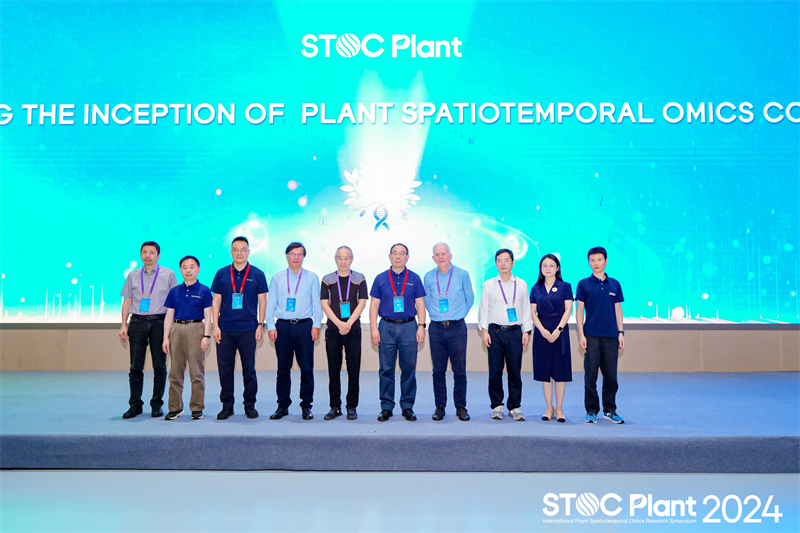 Attendees of the symposium witnessed the establishment of the Plant SpatioTemporal Omics Consortium. (Courtesy of STOC Plant 2024)
Attendees of the symposium witnessed the establishment of the Plant SpatioTemporal Omics Consortium. (Courtesy of STOC Plant 2024)
A primary goal is to develop and promote standardized applications for spatiotemporal omics technology tailored for plant research. The consortium not only aims to streamline technological applications but also to strengthen academic discourse, ensuring that the latest advancements and cutting-edge knowledge in the field are widely communicated. By nurturing a collaborative spirit, the STOC Plant Consortium seeks to facilitate groundbreaking research across the globe, leveraging the power of cutting-edge spatiotemporal omics technology to unlock new potential in plant science.
The idea for a SpatioTemporal Omics Consortium (STOC) was originally conceived by BGI-Research, which recognized the importance of globally-inclusive “team-science” combined with strong industry engagement for tackling the exciting frontiers in spatiotemporal cellular genomics. This vision inspired STOC’s co-founding by a core group of 15 scientists in 2022, along with support from nearly 100 other scientists from around the world.
Spatiotemporal omics technology empowering plant research
Yang Weicai, Academician of the Chinese Academy of Sciences and Professor of Plant Developmental Biology at the Institute of Genetics and Developmental Biology of the Chinese Academy of Sciences, opened the symposium with an impactful speech. He offered a comprehensive review of the progression in life sciences technologies, illustrating how advancements from sequencing technologies to single-cell analysis have significantly propelled diverse research avenues.
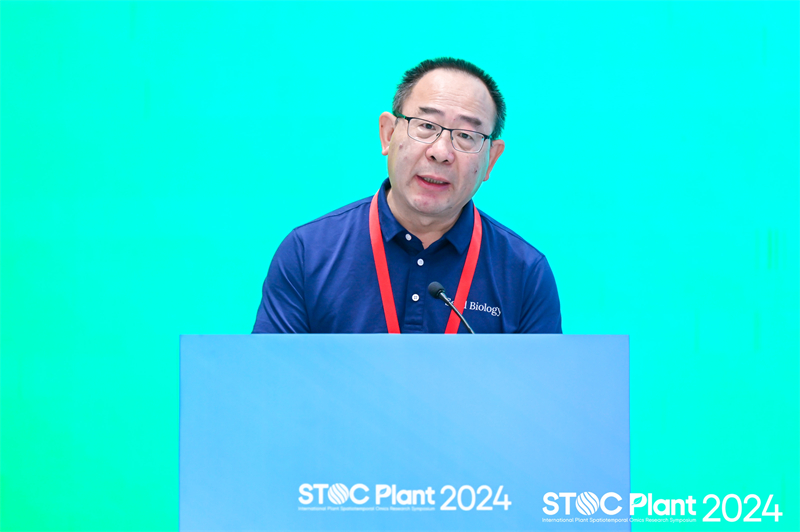 Yang Weicai, Academician of the Chinese Academy of Sciences and Professor of Plant Developmental Biology at the Institute of Genetics and Developmental Biology, delivered an opening speech. (Courtesy of STOC Plant 2024)
Yang Weicai, Academician of the Chinese Academy of Sciences and Professor of Plant Developmental Biology at the Institute of Genetics and Developmental Biology, delivered an opening speech. (Courtesy of STOC Plant 2024)
Highlighting the emergence of spatiotemporal omics technologies, Academician Yang underscored their pivotal role in introducing innovative dimensions to plant research. He emphasized the transformative potential these technologies hold for examining plant biology in a more integrated and dynamic manner.
In his closing remarks, Academician Yang expressed his aspiration for the symposium’s attendees, encouraging them to engage inactive communication and discussion. He looked forward to the collective creation of novel concepts and strategies that could significantly contribute to the advancement of plant research on the global stage.
Wang Jian, Co-founder and Chairman of the Board of Directors of BGI Group, initiated the symposium with a warm welcome to the distinguished speakers and attendees. In his speech, he affirmed BGI’s ongoing dedication to driving technological breakthroughs and fostering platform innovations, to equip researchers with essential tools to delve deeper into life sciences. He also articulated his vision for a collaborative future with scientists across disciplines uniting to forge new frontiers in scientific research, and amplifying their collective contributions to the advancement of human society.
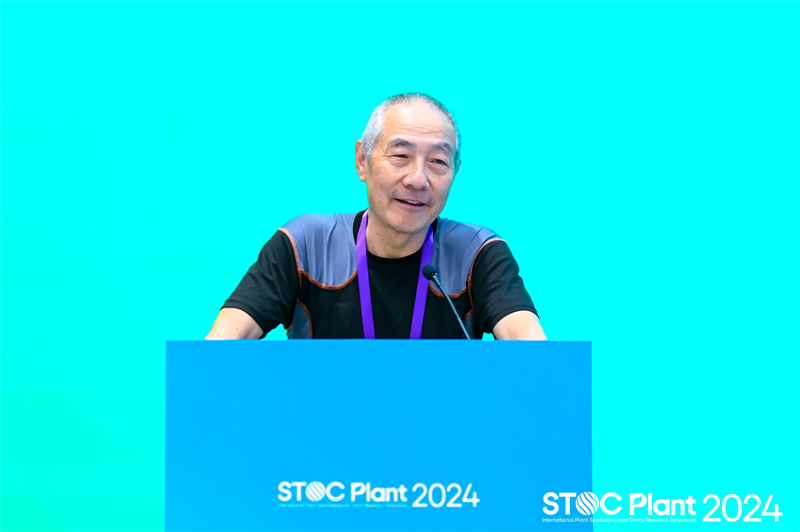 Wang Jian, Co-founder and Chairman of the Board of Directors of BGI Group, delivered an opening speech. (Courtesy of STOC Plant 2024)
Wang Jian, Co-founder and Chairman of the Board of Directors of BGI Group, delivered an opening speech. (Courtesy of STOC Plant 2024)
Spatiotemporal omics has been significantly advanced by BGI's proprietary spatiotemporal omics technology, Stereo-seq. Characterized by its nanoscale resolution and centimeter-scale field of view, Stereo-seq has been widely applied to research across various fields, including embryonic development, neuroscience, pathology, and plant research. This technology has contributed to over 60 publications in prestigious scientific journals such as Cell, Science, Nature, and Cell Research.
Seven major topics to decode new progress in plant research
The symposium illuminated seven main topics central to the latest advancements in plant research: Plant Spatiotemporal Omics Tools and Algorithms; Spatiotemporal Omics & Plant Stem Cell Biology; Spatiotemporal Omics & Plant Organ Development; Spatiotemporal Omics & Plant-Environment Interactions; Spatiotemporal Omics & Plant Metabolism; Plant Spatiotemporal Omics Big Data; and Journal Journey.
Over 40 leading experts from institutions including the University of Queensland (Australia), Peking University, Nanjing University, Southern University of Science and Technology, SciLifeLab (Sweden), BGI-Research, Xi'an Jiaotong University, Northwestern Polytechnical University, Chinese Academy of Agricultural Sciences, University of Science and Technology of China, Chinese Academy of Sciences, Michigan State University (USA), and Zhejiang University, presented on these topics, sharing groundbreaking applications of spatiotemporal omics and single-cell transcriptomics in plant research.
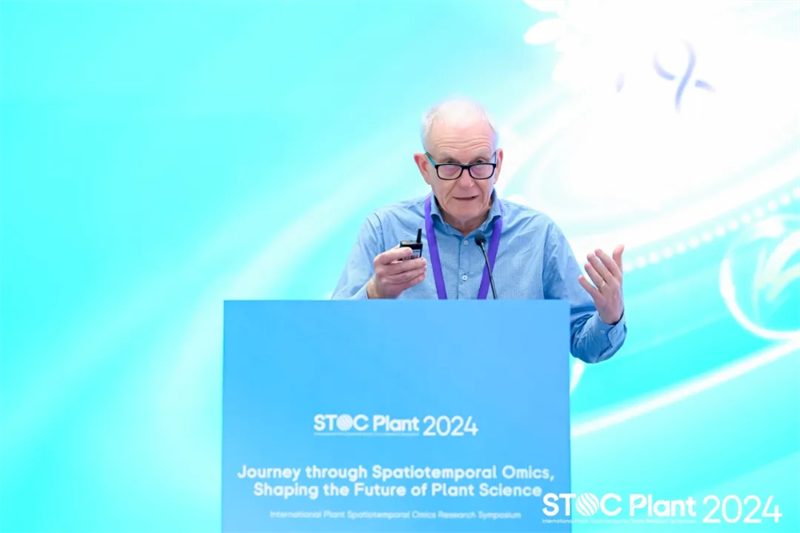 Robert Henry, Professor of Innovation in Agriculture from the University of Queensland, shared his team's progress in plant research. (Courtesy of STOC Plant 2024)
Robert Henry, Professor of Innovation in Agriculture from the University of Queensland, shared his team's progress in plant research. (Courtesy of STOC Plant 2024)
Robert Henry, Professor of Innovation in Agriculture from the University of Queensland, Australia, introduced his team's progress in plant research using long-read sequencing technology and spatial transcriptomics technology. He highlighted the critical role of these technologies in deciphering complex genomes and advancing crop improvement.
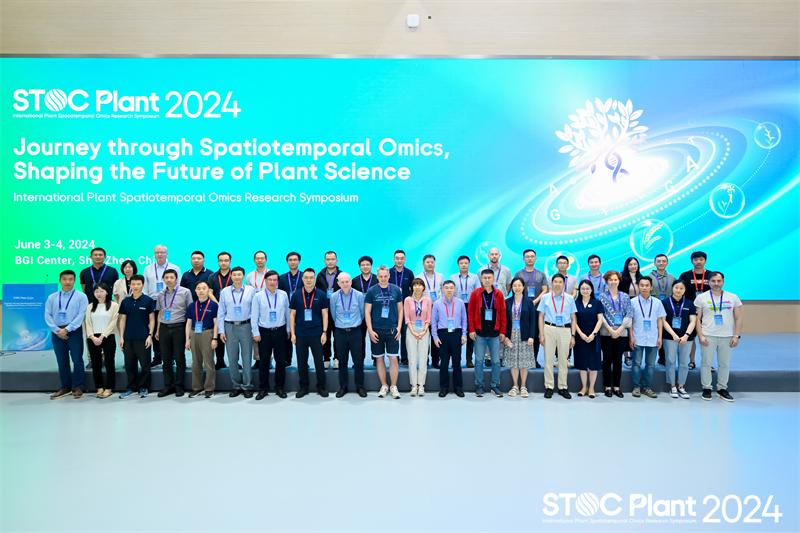 Group photo of all attendees. (Courtesy of STOC Plant 2024)
Group photo of all attendees. (Courtesy of STOC Plant 2024)
The symposium was not only a celebration of academic excellence but also a catalyst for the future advancement of plant research globally. Attendees experienced firsthand the swift evolution of plant spatiotemporal omics technology and the synergistic innovations from the global scientific community. The thematic discussions provided fresh insights and perspectives on addressing pressing issues such as food security and biodiversity conservation.



